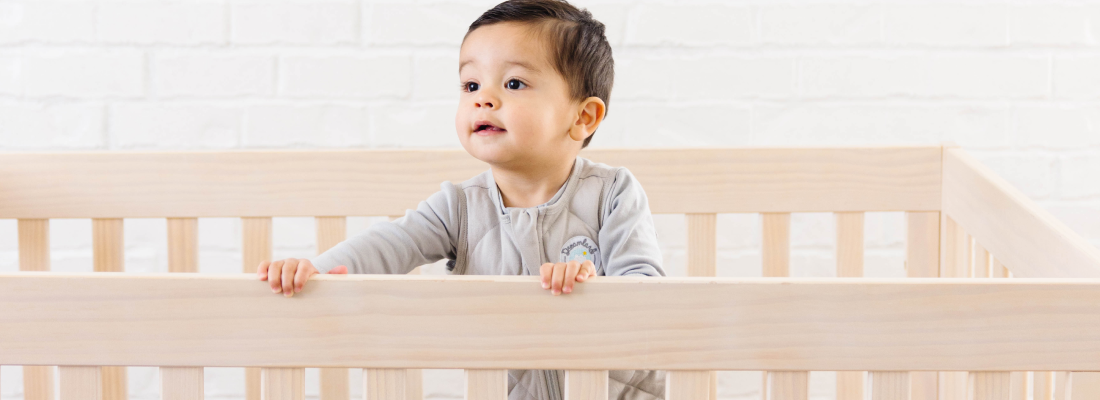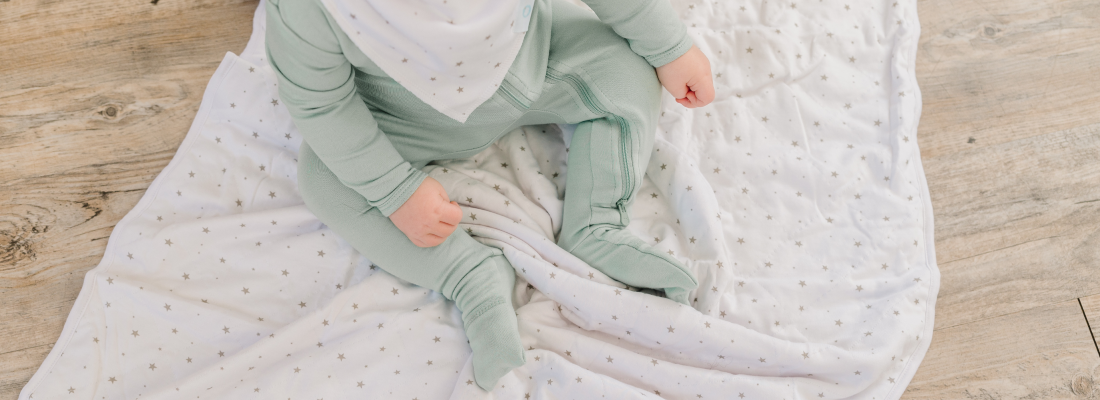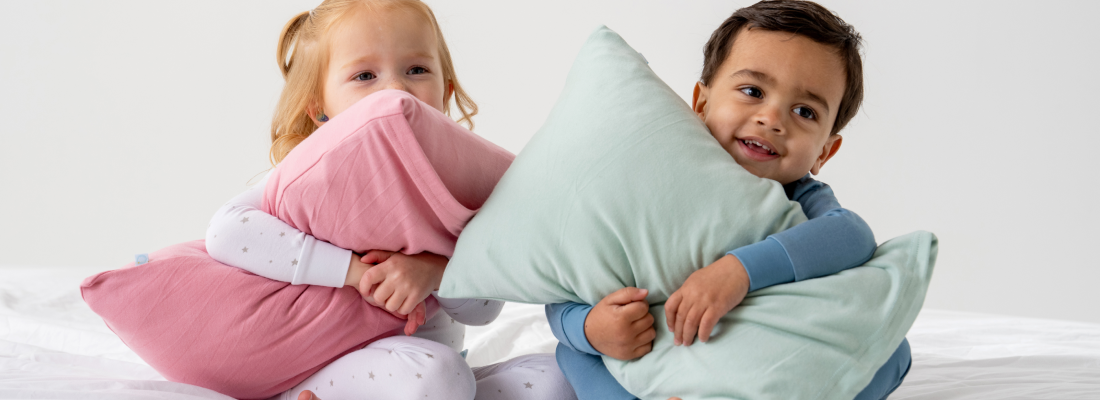Signs and Solutions for Newborn Sleep Regression
By the 8-month mark of your baby's first year, you're really starting to get a handle on who they are and how to take care of them best. You've created an untouchable bond and the developmental milestones you've watched them achieve has made all of the sleepless nights completely worth it.
But with growth comes more changes and, as you'll learn over time, kids' sleep is subject to change. In fact, this is around the time you might see another sleep regression from your little one. Though they've likely been a good sleeper up until now, somewhere between 8 and 10 months your baby will probably have a noticeable setback in her sleeping patterns.
In this article, you'll get a better understanding of what sleep regressions are, why the 8-10 month sleep regression happens, and solutions to get your baby back to sleeping well.
Just remember that when this sleep regression occurs, you've already weathered a lot of what your baby will throw at you when it comes to sleep, from figuring out a newborn sleeping plan and establishing baby's sleep schedule to organizing daytime naps.
You've come through with better parenting strategies to show for it. This will be no different and we'll give you the sleep tips and tricks you need to make it through your baby's 8 - 10 month sleep regression.

What is a sleep regression?
We recently wrote about the 4-month sleep regression (though this sometimes appears as a 6-month sleep regression) and received a lot of insight through sleep consultant Dr. Sarah Mitchell about sleep regressions. Here's what she had to say when we asked her to explain more about what sleep regressions are:
"A sleep regression is when your child's sleep is slightly irritated. The signs of a sleep regression are taking longer to settle into sleep for naps or bedtime. Your child may wake up more frequently in the night and take shorter naps during the day. Sleep regressions are related to PROGRESS... Your child is either physically growing, such as getting molars, or growing neurologically, such as learning to roll over, hover on all fours or walk. There are also sleep regressions related to separation anxiety, and in the toddler years testing boundaries."
By now you know that the 8 - 10 month sleep regression isn't the first one your baby will go through, and unfortunately it won't be their last either. Though this period can be unnerving with a feeling like you're back to square one and a good night's sleep is a distant memory, we actually think it's easier to go through than the 4-month regression. By now you know a lot about what works for your little one and what doesn't so your experience with your months together will help a lot.

So which is it? 8, 9 or 10 months?!
You might have seen this article and thought, "Oh no, is my baby going to have terrible sleep for 3 months straight?!" No, no, that's not it thank goodness.
Unlike the 4-month sleep regression, which can be nailed down within a month's time frame, this regression has a wider range of when it may occur. Some babies will go through it closer to 8 months, while others will be a little older at the 10-month mark.
Since we know all babies develop at different rates, a regression that happens anywhere around this age is normal. It also means that your baby is right on track for their brain development. We know it's hard to be excited about your baby's sleep getting worse, but it's actually a very good sign that your baby is progressing as they should. That's because it relates to separation anxiety - or when your baby starts to show more agitation about the thought of having to be away from you.
(Do know that it's also normal if your baby doesn't go through a sleep regression - some just don't!)
These signs of separation anxiety will disrupt your baby's sleep cycles and start to rear their head between 8 - 10 months. This is the cause for the 8 - 10 month sleep regression.
Signs of the 8 - 10 Month Sleep Regression
If your baby falls between the age of 8 and 10 months and generally does not have sleep issues but has suddenly begun sleeping poorly, it's safe to say that separation anxiety is the culprit. According to Parents Magazine, this is the age when a baby is able to really distinguish between people and has formed emotional attachments to his caregivers.
This will carry over to your baby's sleeping habits. Here are the signs your baby is going through the 8-10 month sleep regression:
- more frequent night wakings (just a reminder that waking once to feed in the middle of the night is still normal for babies that are 8 - 10 months of age, which we discuss here in this article on night feedings)
- waking from the 45-minute intruder and then not being able to go back to sleep (you might remember this from your baby's 4-month sleep regression)
- crying when you leave the room for nap time or bedtime
- refusing to nap
- crankiness upon waking due to not sleeping well
- inability to put themselves back to sleep upon waking
Something else to consider at this time is if your baby is also going through a nap transition. Most babies at this age will drop their 3rd cat nap down to 2 long naps (if they haven't already) and if that's happening while a regression is happening, too, it can be a bit of a double whammy. We have advice on how to make a baby nap transition smoother in this article.
Now that you've established your child is experiencing their second sleep regression in their first year of life, it's time to find out what to do about it.
Solutions for Tackling the 8 - 10 Month Regression
Though the attachment you've created with your baby is truly something special, it can pull at your heart strings when your baby bursts into tears every time he or she is away from a parent or caregiver.
This can also be extremely stressful on parentings. We've prepared a list of our best solutions to help you approach this regression in a positive way and get your baby back on his sleep schedule.
Here's how to get your baby's sleep back on track:
- Keep your bedtime routine consistent. If you've noticed that you've let it slack a bit, it's time to tighten it back up. We have a full crib routine we wrote about here, including things like baby massage, white noise, blackout curtains, and the weighted sack from Dreamland Baby. In case you haven't heard of this amazing wearable blanket, it's lightly weighted to mimic the hug you'd give your baby. Perfect for curing separation anxiety! Mom Kayla C. write about the Dreamland Baby Weighted Sack:
"Heavenly! I had purchased a sleep sack and was excited to use it! A friend of mine happened to have one she got as a gift and ended up not using so we’re using that one and my son (9 months) has been sleeping like an angel. He was waking up 4 times a night when before he was sleeping through the night. We’re back to sleeping again and I love it!"

- Keep new sleep props at bay. As tempting as it is to rock or nurse your baby to sleep because you know it will work, quick fixes are not helpful long-term. Your baby will come to depend on this and that's something you won't want.
- Keep your good-bye short. A simple hug, "I love you," with reassurance that you'll see them later is all you need once you lay them down in their crib. However, don't ever try to walk away without them noticing. This will take away your baby's trust that you'll return.
- Have periods of separation when your baby is awake. This can be as simple as putting your baby in a safe place to play while you go to the bathroom. This way your baby will begin to realize that when you leave, you always come back. Leaving your baby with your spouse or another caregiver while you run an errand will also help.
- Try not to show sad emotion in front of your baby. This can be hard, but the more calm you are in front of them the easier it will be for them to calm down, too.
- Offer reassurance if your baby wakes. If your baby wakes up mid-nap or in the middle of the night (and you know hunger isn't the reason) we suggest giving your baby a few minutes to settle themselves back to sleep. Chances are they will be able to do it, even with a few tears. However, if you need to console him, that's completely fine. Just make it brief: a hand on their chest to calm them to let them know you're close by can work wonders.
Even with these solutions in place, you might find that your baby continues to get upset when they're supposed to be sleeping. Often times, your baby may only cry for a few minutes before settling himself into sleep on his own.
If you don't want to use any form of cry it out (we get it!) we suggest utilizing our other sleep training methods techniques to get through this regression. You may have not needed these for months, but with a sleep disruption like this one, you might need to pull out all the stops!
What is separation anxiety in babies?
Separation anxiety essentially refers to the anxiety a baby feels when their caregiver leaves them. When they feel separation anxiety, they may cry or become clingy as they may feel unsafe or upset being in new situations or with new people without their parents.
It usually begins when babies are around 9 months old but some babies can show signs of separation anxiety the nearest for 5 months. In contrast, some experience it when they are slightly older and others show no signs of such anxiety.
It's important to note that separation anxiety is completely normal and it is a sign of secure attachment, which refers to the strong bond between a baby and his or her caregiver or parent. Your attachment is very important for a child's emotional and social functioning.
What are other signs of separation anxiety in babies?
Signs and symptoms of separation anxiety in babies include:
- Clinginess
- Refusing to separate or do things that require separation
- Crying out
- Waking up during the night
- Refusing to sleep alone
- Tensing up around strangers
- A strong preference for only one parent
- Temper tantrums or crying when separating from a parent or caregiver
- Being easily comforted by a parent upon their return
How do I know if my baby has separation anxiety?
There are several signs to indicate whether your baby is suffering from separation anxiety.
One sign is that your child is clingier than usual and does not want you to go away. For example, he or she may be picked up by grandma and start crying, asking for their parent or caregiver, or you might be dropping your baby off at daycare and she or she may be trying and hanging on to you so that you don't leave.
Your baby probably has separation anxiety if she tries when you leave the room where she is, even if it's only for a very short time. Additionally, she might fight going down for a nap or to bed at night because she does not want to be away from you or she may refuse to go to sleep if you’re not close by. The baby also might have anxiety if she wakes up often during the night.
It’s often worse if your baby is tired, hungry or is not feeling well.
If you're not sure whether it's separation anxiety or not, pick up your baby when she's crying. If she stops, it's separation anxiety and if she doesn't, it's probably something else.
At what age does separation anxiety typically emerge?
Separation anxiety usually starts when a baby is around 8 or 9 months old; however, all babies are different and may experience it sooner (around 4 or 5 months), later, or not at all.
It develops as babies begin to understand object permanence, and when a parent leaves their sight, they are left feeling unsettled, and they also don't have a concept of time, which leads to anxiety.
Broadly speaking, separation anxiety occurs when a child is between 10 and 18 months old and usually ends by the time they're 3.
What are the stages of separation anxiety?
There are three phases of separation anxiety: protest, despair, and detachment, and they are closely connected to John Bowlby's attachment theory.
These phases were originally identified in the 1950s, when children would enter for treatment and they would be separated from their mothers.
In the protest phase, children expect their mothers to respond to their cries and when they don't children are visibly upset and heartbroken.
During the despair phase, the mother is still not present and the child comes to be quiet and very withdrawn, giving up all hope.
During the denial/detachment phase, children are more interested in their surroundings and essentially trying to make the best of the situation. When their mothers return, the children act like they no longer know them and do not cry when they leave again.
Should I sleep train during sleep regression?
Whether you sleep train during a regression will depend on you and your baby. Every child is different, so you will have to weigh the pros and cons.
During a regression, your baby's sleeping habits change and can be unpredictable, but it’s important to really understand what’s going on.
Your baby isn’t actually going backwards, or “regressing;” on the contrary, she’s advancing and growing. These periods are extremely important for her as she’s going through major developmental milestones and this often disrupts sleep. Whether she’s learning to sit up without support, starting to roll over, or developing her own sleep cycle, it’s all important, natural and nothing to worry about.
As for sleep training during these periods, it’s important to note that all babies are different and they will react to the method differently. You will need to consider your child’s age, her ability to self soothe, and your ability to distinguish between what she needs from what she wants.
If you’re sleep training during a regression, it’s not clear that it will work. If you decide to wait until it has passed, you can focus on:
- Being flexible
- Keeping your routines consistent
- Maintaining a calm environment
- Adapting your sleep schedule
Should you let the baby cry it out during sleep regression?
There’s no “right” answer as to whether or not you can use the Cry It Out (CIO) approach during a sleep regression. This will depend on how comfortable you are with your baby’s crying. Nobody knows your baby like you do.
During a sleep regression, your baby is undergoing very important changes and reaching developmental milestones. If you believe she would benefit from the CIO approach during the period, you can certainly let her cry, and if you prefer to wait until a period when her sleep habits are more predictable, you can wait. Do keep in mind that, because she is experiencing important changes, using the CIO approach may not be as effective as during a “normal” period.
How long should you let an 8-month-old cry it out?
The Cry It Out (CIO) method, which is sometimes called controlled crying, is a sleep training approach where you allow your baby to cry while they learn to fall asleep on their own. It’s worth noting that there are many different CIO methods that allow for different amounts of crying.
Depending on the method you use, you can allow your 8-month-old baby to cry for more or less time. For example, using the Ferber method, let your baby cry for 5 minutes the first time before responding. After that, extend your response time in 5-minute increments.
According to the Bucknam and Ezzo method, you should be able to let your 8-month-old baby cry for 15 to 20 minutes before sleep.
Final Thoughts on the 8-10 Month Sleep Regression
No doubt sleep regressions in babies are tough on parents.
Feeling like there is backwards progress in something you've worked hard to help your baby with can be frustrating. Children and sleep is a tricky topic. But it's important to realize that sleep regressions are temporary. Staying calm, patient, and focused on the outcome is the best thing you can do to help your baby get through this as quickly as possible.
And let's be honest, it does feel pretty amazing to have a little reminder that you're their favorite human (even if it does mean a little less sleep for a bit).


